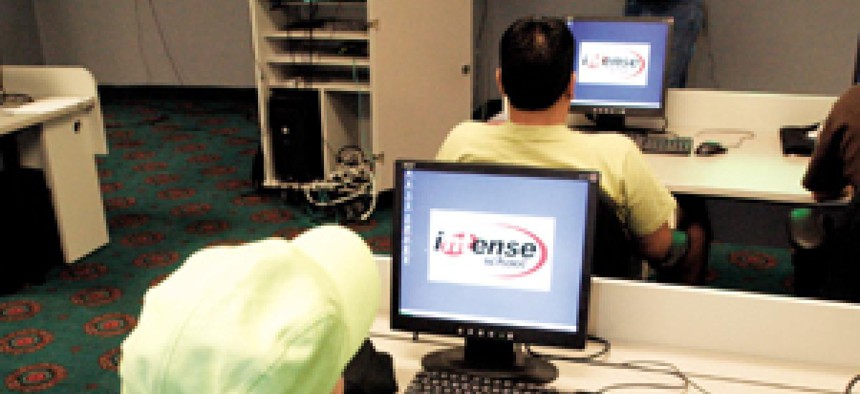In your FACE

Federal agencies and contractors are swelling enrollment at IT boot camps, the intense training courses that drive students through 10 to 12 grueling hours of daily instruction over a few days.
Federal agencies and contractors are swelling enrollment at IT boot camps, the intense training courses that drive students through 10 to 12 grueling hours of daily instruction over a few days. The boot camps provide advanced hands-on training and professional certifications required to equip staff to prevent IT security threats and meet federal mandates.Training companies report that enrollment of civilian and military personnel and contractors in boot camps has risen from 10 percent to 50 percent in the last few years. This growth is due in part to the increase in attention to security issues since the Sept. 11 attacks. More recently, the administration has begun handing out annual report cards assessing the IT security capabilities of federal agencies, triggering a scramble among systems personnel to get the required certifications and training."People will all of a sudden see that their scorecards are coming up and panic," said Barry Kaufman, chief technology officer and executive vice president of product development at Intense School Inc. of Fort Lauderdale, Fla. Intense School, which has doubled the size of its class facilities in Washington since the beginning of the year, caters mainly to the federal government and government contractors, offering certification courses and an "ethical hacking" class at a Springfield, Va., facility, Kaufman said. Kevin Rogers, vice president of federal sales at Global Knowledge Inc. of Cary, N.C., said demand for the company's IT boot camps has grown by 20 percent over the last year."We saw a large uptick in the number of students getting certifications in 2005 ... primarily [because] we've come out of the Internet bust and companies are ramping up," he said. Government's increased outsourcing of IT jobs has also contributed to the increase. It's not only IT boot camps in Washington that have seen their rosters increasing. James Carrion, president and founder of Mountain View Systems LLC of Bellvue, Colo., reported a 30 percent increase in the number of students from federal agencies, U.S. military branches and contractors over the last three years. Designed for those who have a solid grounding as systems administrators, boot camps offer professional certifications that increasingly are being required by the federal government. Examples of some of the more common ones are the Certified Information System Security Professional, Cisco Certified Network Associate and Microsoft Certified Systems Engineer.The IT boot camps offer participants training, certification testing, accommodations and meals in a single location with minimal distractions, letting students get certification training in less than half the time it would take with traditional training courses. Class sizes are kept to fewer than 20 students to ensure they get personalized attention in classrooms, which have the most up-to-date computer equipment. After a 10- to 12-hour day of classes, students work alone or in teams on homework assignments at their computers. Intense School's training facilities near Washington consist of two computer classrooms in the windowless basement of the Best Western hotel in Springfield, Va. Students eat and sleep at the hotel for the duration of the boot camps.Government agencies and systems integrators that do business with the government not only require certified systems administrators to operate their IT systems, but they also must meet federal policy mandates. The federal government requires that IT professionals be certified and accredited to perform information security tasks, based on guidelines set by the National Institute of Standards and Technology.The Federal Information Security Management Act of 2002 directs NIST to develop IT security standards and guidelines. Each federal agency is required to implement an information security program. The law also mandates the Office of Management and Budget to oversee IT security policies and practices. NIST provides guidelines for commercial and government agencies.Agencies must give OMB annual reports about the effectiveness of their IT security programs and include an evaluation by the agency inspector general or an external auditor. OMB reviews and grades the IT security reports."The federal government is obviously concerned about the vulnerability of information systems," said Jeff Pribram, Intense School's government affairs director.The Defense Department has its own IT security certification and accreditation requirements for its agencies and military services. Limited budgets and time also propel demand for boot camp certification courses. Members of the military are pressed for time because of the war in Iraq, while contractors must get certified quickly for work they have bid on or won from a federal agency.Gary Cubbage, a Booz Allen Hamilton Inc. vice president who oversees the company's IT systems delivery, said the short timeframe of boot camps is more cost-effective than designing and running in-house programs. Boot camps also give participants hands-on training, so they are ready to get on the job after they complete the course.The company uses boot camps when it gets a request from a client for certain certifications or when it wins a contract that will require certified IT specialists, Cubbage said. Booz Allen has increased by 10 percent to 20 percent a year the number of employees it sends to external boot camps, especially in IT program management, IT systems engineering and security accreditations."We find we need certifications very quickly," Cubbage said. Staff Writer Roseanne Gerin can be reached at rgerin@postnewsweektech.com.


Instructor Dave Miller directs the Intense School Inc.'s Microsoft Certified Engineer Program 2k3 Upgrade.
Rick Steele
NEXT STORY: Payne leaves Qwest